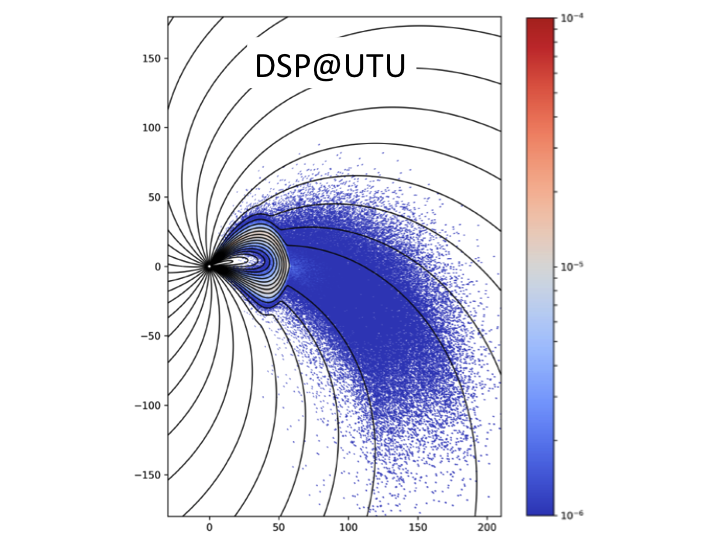Project 7, Recruitment
Project description: Solar energetic particle (SEP) events are large outbursts of high-energy ions and electrons associated with solar eruptions, such as flares and coronal mass ejections (CMEs). Particles in the largest SEP events are accelerated in CME-driven coronal shock waves. The objective of SWATNet project 7 is to make crucial steps towards accurate forecasting of SEP emission from CME-driven shock waves utilising state-of-the art numerical modelling. The project exploits and further develops two SEP acceleration codes of the University of Turku: The SOLPACS code traces the coupled evolution of energetic ion distribution and intensity of unstable plasma waves upstream of the CME-driven shock self-consistently, and the DSP code traces charged particles in the turbulent plasma downstream of the shock. The codes will be merged into a single numerical simulation model that can self-consistently trace ions gaining energy in the CME-affected coronal and interplanetary plasma environment.
More information of the project: Prof. Rami Vainio (rami.vainio (a) utu.fi)
Host: University of Turku, Finland.
Secondment Host: KU Leuven, Belgium (9 months).
Industrial Training: Hungarian Solar Physics Foundation, Gyula Bay Zoltán Solar Observatory, Gyula, Hungary (solar observations, 1 month), Aboa Space Research Oy, Turku, Finland (3 months; energetic particle instrumentation).
The selected Early-Stage Researcher (ESR) will pursue a 4-year PhD double degree awarded by University of Turku (UTU), Finland, and KU Leuven, Belgium. The funding from SWATNet covers the first 36 months of the PhD project. The fourth year of the PhD project will be funded by a work contract with the University of Turku under local terms and conditions. Note that there is mandatory mobility involved in the programme.
Project specific requirements
Mobility rule: The applicant must not have resided or carried out their main activity (work, studies, etc.) in Finland for more than 12 months in the 3 years immediately before the call deadline ( see details for the MSCA mobility rule here).
Required skills: fluent programming skills
Desired skills: experience in high-performance computing; knowledge of fortran and Python; prior knowledge of computational space plasma physics.
Host degree requirements: Master’s Degree in physics/astronomy (with a minor in mathematics) or in applied mathematics (with a minor in physics), or equivalent. The selected applicant has to produce certified copies of the Degree Certificate / Diploma prior to the signing of the work contract.
Secondment host degree requirements: M.Sc. degree in physics, astrophysics or mathematics with at least cum laude (or another distinction, e.g. scientific publication).
Host language requirement: see Language requirements for admission to the UTU Graduate School doctoral programmes.
Secondment host language requirements: Proficiency in English is required (IELTS minimal general score 7 and no subscores below 6.5; TOEFL minimal general score 94 and no subscores below 22); If there is no official language test, the supervisor can confirm the English language proficiency, but the candidate may be required to follow an English language course during the first year of the PhD.
Send your application using this link

